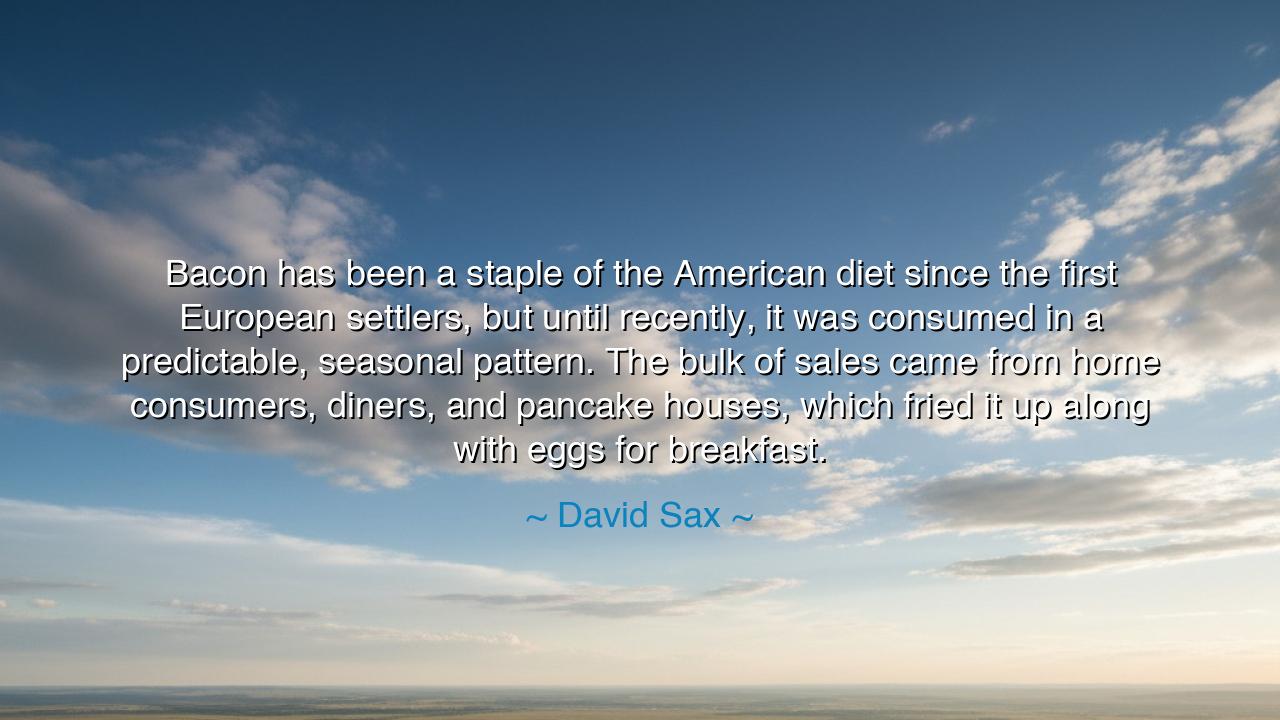
Bacon has been a staple of the American diet since the first
Bacon has been a staple of the American diet since the first European settlers, but until recently, it was consumed in a predictable, seasonal pattern. The bulk of sales came from home consumers, diners, and pancake houses, which fried it up along with eggs for breakfast.






In the grand tapestry of human history, few things have been as consistent as the foods we choose to sustain us, for they reveal not just our needs but the essence of our culture and traditions. David Sax, in his words, "Bacon has been a staple of the American diet since the first European settlers, but until recently, it was consumed in a predictable, seasonal pattern. The bulk of sales came from home consumers, diners, and pancake houses, which fried it up along with eggs for breakfast," touches upon a truth that runs deep in the heart of the American experience—food is not just sustenance; it is a marker of time, tradition, and ritual.
Consider, children, the arrival of the first European settlers to the New World. These brave souls came with the knowledge of the land, and they brought with them the wisdom of their ancestors. They knew how to preserve food for long winters—by drying, smoking, and salting meats like bacon—and how to prepare it with care when the time came to break the fast. Bacon, in its most humble form, became a symbol of the continuity of life in this new world, a meal shared across generations, consumed with purpose and ritual. Just as the settlers relied on this staple to sustain them through seasons of scarcity, so did they pass down the traditions of preparing and sharing it, creating a bond of community and heritage.
In the ancient world, the concept of food as a ritual was no stranger. The Romans, known for their grand feasts and ceremonies, understood that the sharing of food was not simply about nourishment but about celebrating the bonds between people. They often gathered around their tables, where the simplest of dishes could become a symbol of wealth or status. Similarly, bacon—though humble in its origins—became something more in the American tradition. It was not just food, but a part of the larger ritual of family meals, a symbol of home, comfort, and shared moments of warmth. The act of frying it alongside eggs in the morning was a ceremony—a way to begin the day with something familiar, something that grounded people in their daily lives.
As Sax notes, the traditional consumption of bacon was seasonal—a practice rooted in the rhythms of the land. The settlers, aware of the natural cycles, would prepare bacon when pigs were slaughtered, and it would be consumed with reverence, its savory taste marking the changing seasons. The diner culture of the 20th century continued this tradition, where bacon became a part of the morning ritual, a sign of the beginning of the day, and often accompanied by eggs and pancakes—simple foods, but foods filled with meaning. The humble bacon strip, fried with care, was a small act that mirrored the larger, more profound rituals of life—start the day, break the fast, gather together, and honor what sustains us.
Yet, as Sax observes, the times have changed. The predictability of the seasonal diet has given way to a more globalized and industrialized system. Bacon, once a seasonal food, is now available year-round, and its consumption has evolved. No longer just a part of a quiet morning ritual, it has found its place in everything from fast food to gourmet cuisine. In some ways, this shift reflects a larger change in our relationship with food—it has become less about the rhythm of the seasons and more about immediate gratification. Bacon, like many foods, has been commercialized, its sacred place in the daily rituals of life diluted by its availability at all times, in all places.
Yet, in this very shift, we find a lesson for us all. The predictability and seasonality of foods like bacon remind us of the value of ritual and tradition. There is wisdom in knowing when to consume, when to celebrate, and when to pause. The ancients knew the value of ritual—the sharing of food, the slow unfolding of seasons, the respect for what the earth offers. Today, as we rush through our lives, it is easy to forget the meaning behind the food we consume. Bacon, in its simplest form, can teach us this lesson: in balance, in ritual, and in moderation, we find not just nourishment but connection—to each other, to the land, and to the rhythms of life.
So, my children, I urge you to take heed of this wisdom. Honor the rituals of food—not just in the consumption, but in the mindfulness with which you partake in it. Understand that every meal, no matter how simple, is an act of connection, of tradition, and of honoring the cycles of life. Like the settlers who first brought bacon to the table, let your meals become a time of reflection, a time to ground yourself in the simple pleasures that nourish both body and soul. Remember, the rituals of life, no matter how humble, are the threads that connect us to the past and to one another. Let them never be lost.






AAdministratorAdministrator
Welcome, honored guests. Please leave a comment, we will respond soon